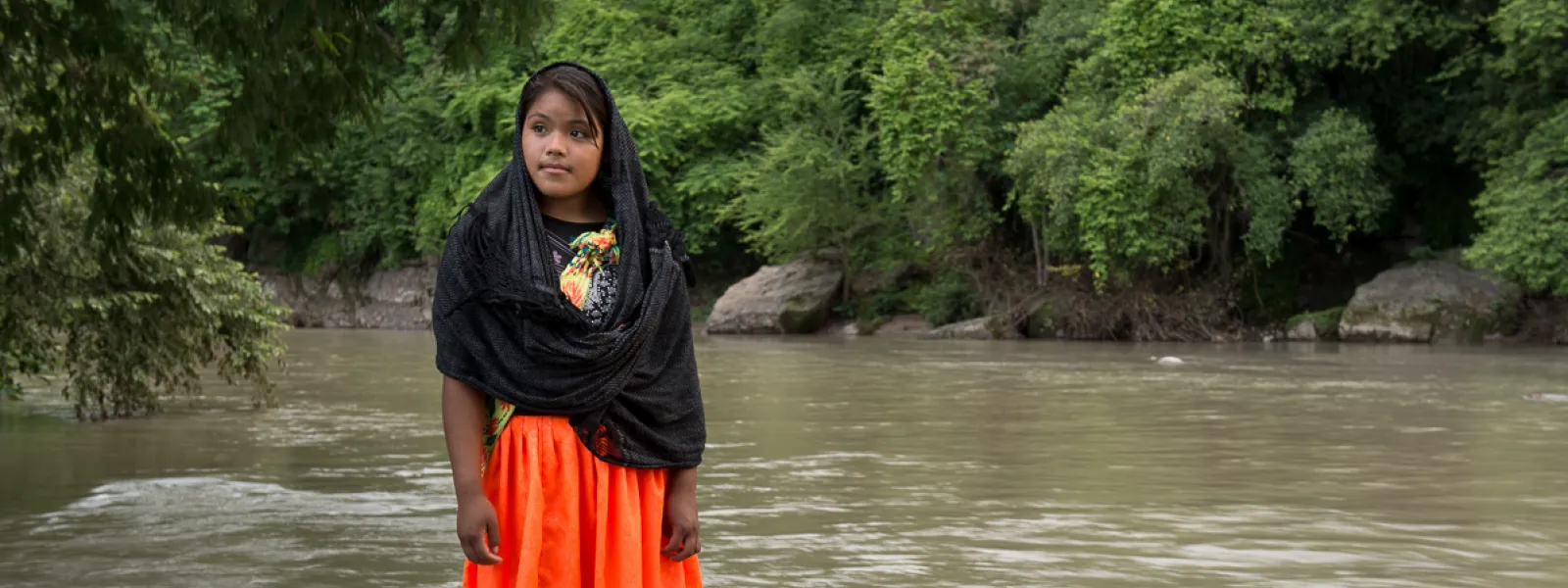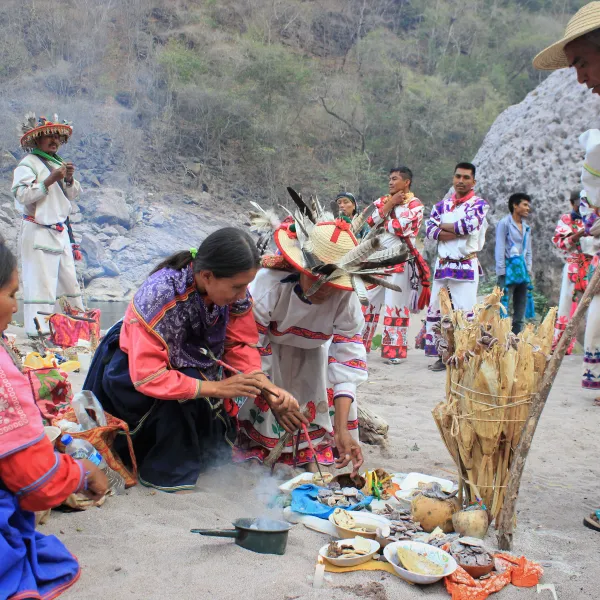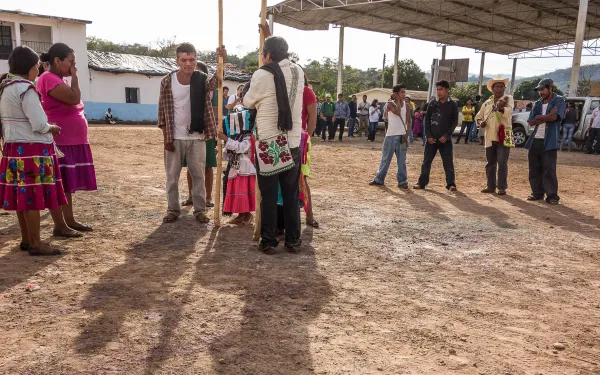
Project
Photo: Jaime RojoSaving the San Pedro Mezquital River from a destructive large dam
If built, the Las Cruces Dam would block the San Pedro Mezquital, the last free-flowing river in Mexico’s western Sierra Madre. It would affect fisheries, agriculture, livestock and other activities that nearly 12,000 families depend upon for survival.
The reservoir would flood the village of San Blasito and impact the town of Saycota. It would destroy an indigenous ceremonial center and 14 sacred sites. And it would restrict the water and nutrients that the river carries to Marismas Nacionales—the National Wetlands—which harbors one of the largest mangrove forests in Mexico.
In September 2014, the Mexican government approved the dam, despite the environmental impacts and without consulting and obtaining consent from affected indigenous communities.
The authorization ignored the technical opinions of national authorities, as well as recommendations from international organizations about the threats the project poses to the environment and human rights.
AIDA is working hand-in-hand with local organizations to support the communities affected by the project in their fight to have their rights respected.
Partners:

Related projects
Latest News

Organizations alert the United Nations that construction of the Las Cruces hydropower plant will violate human rights in Nayarit, Mexico
UN Special Rapporteurs are asked to urge the Mexican government to guarantee the rights of indigenous peoples and coastal communities that would be affected by the project. Mexico City. The Interamerican Association for Environmental Defense (AIDA) has sent an urgent appeal to several United Nations Special Rapporteurs showing that construction of the Las Cruces hydropower plant will violate the human rights of communities in western Mexico. The project will affect coastal communities as well as the Cora, Tepehuano, Huichol and Mexicanero indigenous peoples along the San Pedro Mezquital river basin in the state of Nayarit. We sent the appeal to Special Rapporteurs on the issues of adequate housing, indigenous rights, extreme poverty as well as the rights to food, safe drinking water and sanitation and to the Independent Expert on the enjoyment of a safe, clean, healthy and sustainable environment. We filed the appeal on the behalf of economic, environmental and community organizations in areas that would be affected by the project. These include the Inter-Community Council of the San Pedro River, the Náyeri Indigenous Council, the Nayarit Riverside Federation, Nuiwari, the Mexican Center for Environmental Law (CEMDA), the Ecological Mangrove Group, SuMar and representatives of the town of Boca Camichín. In the appeal, we asked the Special Rapporteurs to urge the Mexican government “to guarantee the rights of the indigenous peoples and coastal communities of the San Pedro Mezquital river to information and participation, consultation and consent, as well as to food, clean water and sanitation, and to the right to enjoy a safe, clean, healthy and sustainable environment.” We also asked the UN experts to visit the site of the proposed hydropower project to find out first hand the damages it will cause on the environment and human rights. The project will affect indigenous lands – mostly those of the Coras – by forcibly evicting inhabitants and damaging sacred sites. This would violate the human rights to adequate housing, water and livelihoods as well as to culture and education. “Our lands and natural resources are the most important aspects of our culture," said Julián López Cánare, coordinator of the Náyeri Indigenous Council and a member of the Intercommunity Council of the San Pedro River. “Every day we fear that our sacred sites will be flooded or damaged.” Ernesto Bolado, director of SuMar, said the appeal to the UN is a demonstration of how the Cora, Huichol, Tepehuana and Mexicanera communities were never consulted on the project as required by Convention 169 of the International Labour Organization (ILO). What is more, consent for the expropriation of land and changing its use was requested at community assemblies under false pretenses, the promise of government benefits and even with bullying. Mexico’s state-owned electric utility Comisión Federal de Electricidad plans to build and operate the Las Cruces hydropower dam on the San Pedro Mezquital river at a location 65 km north of the city of Tepic, Nayarit. The plant will have 240 MW of installed capacity generated by three turbines fed by water from a 188-meter high dam holding a reservoir measuring 5,349 hectares. The project will operate only four months a year at regular output, and it will meeting 0.9% of the energy demand of the West Central Mexico in 2026, equivalent to 0.28% of the total installed capacity in the country[1]. “The urgent appeal is a request for United Nations Rapporteurs to investigate the facts concerning the full enjoyment of human rights of the people and communities that will be affected by the hydroelectric project," said AIDA attorney Sandra Moguel. The environmental assessment report for Las Cruces acknowledges that the project will lead to the substitution of agriculture and small-scale livestock ranching for a dependence on fishing in the reservoir. “It is unthinkable to convert subsistence farmers into fishermen or tour operators,” said Marcos Moreno, an oyster farmer in Boca Camichín and a member of the Intercommunity Council of the San Pedro River. You can read the alert sent to the UN Special Rapporteurs (in Spanish). [1] Las Cruces Environmental Impact Assessment, Chapter II, pages 4-12, 18, 19 and 77.
Read moreDams, mines threaten indigenous rights: Recommendations from UN human rights expert
By Jessica Lawrence, Earthjustice's research analyst A longstanding goal of Earthjustice and the Interamerican Association for Environmental Defense (AIDA) has been to sound alarms at the United Nations, in national courtrooms and in international fora such as the Inter-American Commission on Human Rights about environmental and human rights violations associated with mines and dams. Indigenous peoples are particularly vulnerable to the harmful effects of such extractive and energy industries in their territories. Last April, Earthjustice and AIDA provided evidence of these harms, as well as recommendations about how to avoid them, to U.N. indigenous rights expert James Anaya, who recently issued a report on extractive and energy industries and indigenous peoples. Comments from Earthjustice and AIDA focused on mine closure, describing how inadequate closure, restoration or monitoring can cause severe, long-term environmental contamination that can violate indigenous and human rights. We identified steps that countries can take to prevent these problems, including enacting strong laws on pabipty of mine operators and requiring operators to provide financial guarantees to ensure adequate clean-up during and after mine closure. Such measures can help protect human rights to health, clean water and a clean environment, as well as indigenous rights to culture, food, a means of subsistence and their lands and natural resources. Anaya’s report includes a number of recommendations with environmental and health imppcations. Key recommendations include: Guaranteeing indigenous communities’ right to oppose extractive and energy projects without fear of reprisals, violence, or coercive consultations. If a government decides to proceed with a project without their consent, indigenous communities should be able to challenge that decision in court. Rigorous environmental impact assessment should be a precondition. Indigenous communities should have the opportunity to participate in these assessments, and have full access to the information gathered. Governments should ensure the objectivity of impact assessments, either through independent review or by ensuring that assessments are not controlled by the project promoters. Measures to prevent environmental impacts, particularly those that impact health or subsistence, should include monitoring with participation from the pubpc, as well as measures to address project closure. If governments and project operators followed Anaya's recommendations, it would substantially reduce the harm caused to indigenous peoples by the often shameful and irresponsible conduct of extractive and energy industries. AIDA, to which Earthjustice provides significant support, works with local communities to address human rights violations from extractive industries throughout the hemisphere, including the Barro Blanco dam in Panama, the Belo Monte dam in Brazil, the La Parota dam in Mexico, and mines in the Andean ecosystems of Colombia.
Read more